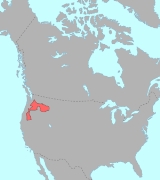
Plateau Penutian languages
Encyclopedia
History
Plateau Penutian as originally proposed was one branch of the hypothetical Penutian phylum as proposed by Edward SapirEdward Sapir
Edward Sapir was an American anthropologist-linguist, widely considered to be one of the most important figures in the early development of the discipline of linguistics....
. The original proposal also included Cayuse
Cayuse
The Cayuse are a Native American tribe in the state of Oregon in the United States. The Cayuse tribe shares a reservation in northeastern Oregon with the Umatilla and the Walla Walla tribes as part of the Confederated Tribes of the Umatilla Indian Reservation...
(which was grouped with Molala into Waiilatpuan branch); however, this language has little documentation and that which is documented is inadequately recorded. Thus, the status of Cayuse within Penutian (or any other genealogical relation for that matter) may very well forever remain unclassified
Unclassified language
Unclassified languages are languages whose genetic affiliation has not been established by means of historical linguistics. If this state of affairs continues after significant study of the language and efforts to relate it to other languages, as in the case of Basque, it is termed a language...
.
The Sahaptian grouping of Sahaptin and Nez Percé has long been uncontroversial. Several linguists have published mounting evidence in support of a connection between Klamath ( Klamath-Modoc) and Sahaptian. Recently, Berman (1996) provides rather convincing evidence to include Molala within Plateau Penutian. Recent appraisals of the Penutian hypothesis find Plateau Penutian to be "well supported" by specialists (DeLancey & Golla (1997: 181; Campbell 1997), with DeLancey & Golla (1997: 180) cautiously stating "while all subgroupings at this stage of Penutian research must be considered provisional, several linkages show considerable promise" (Campbell 1997 likewise mentions similar caveats). Other researchers have pointed out promising similarities between Plateau Penutian and the Maiduan family, although this proposal is still not completely demonstrated.
See also
- Penutian languagesPenutian languagesPenutian is a proposed grouping of language families that includes many Native American languages of western North America, predominantly spoken at one time in Washington, Oregon, and California. The existence of a Penutian stock or phylum has been the subject of debate among specialists. Even the...
- Maiduan languagesMaiduan languagesMaiduan is a small endangered language family of northeastern California.-Family division:The Maiduan consists of 4 languages:# Maidu # Chico † # Konkow # Nisenan...
- Sahaptian languagesSahaptian languagesSahaptian is a sub-grouping of two languages of the Plateau Penutian family spoken by Native American peoples in the Columbia Plateau region of Washington, Oregon, and Idaho in the northwestern United States.-Family division:Sahaptian includes 2 languages*Kittitas *Klickitat*Nez Percé**Nez Percé...
- KlamathKlamath]The Klamath are a Native American tribe of the Plateau culture area in Southern Oregon.-Pre-contact:Prior to the arrival of European explorers, the Klamath people lived in the area around the Upper Klamath Lake and the Klamath, Williamson, and Sprague rivers...
- MolalaMolalaThe Molala were a people of the Plateau culture area in central Oregon, United States. Some consider them extinct, though they are one of the Confederated Tribes of the Grand Ronde Community of Oregon, with 141 of the 882 members in the 1950s claiming Molala descent.-Language:The Molalla language...
- CayuseCayuseThe Cayuse are a Native American tribe in the state of Oregon in the United States. The Cayuse tribe shares a reservation in northeastern Oregon with the Umatilla and the Walla Walla tribes as part of the Confederated Tribes of the Umatilla Indian Reservation...

